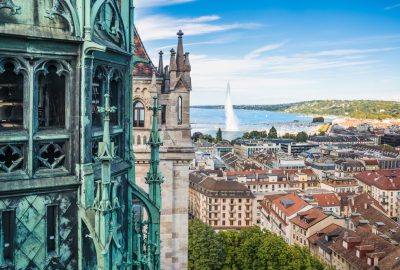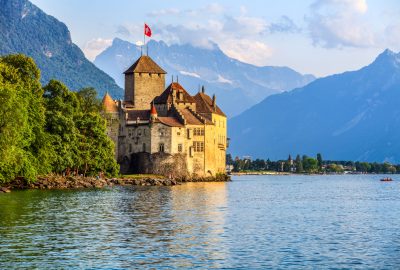Geneva is one of the most sophisticated and expensive cities in the world and located at Europe’s largest Alpine lake: Lake Geneva (or Lac Léman in French). In an official multi-lingual county like Switzerland Geneva goes under many names: Genève in French, Genf in German and Ginevra in Italian. The city aims for the number 1 spot at many other things. Best chocolate, boutiques, restaurants, jewellers, biggest banks, fastest cars, the most beautiful women; the list goes on and on. If I were to visit Geneva again, I would go during winter season. I fondly remember all the action around the lake, sitting around in sauna bars, drinking and chatting till morning hours. For all you explorers and geeks out there, Geneva has even more to offer. Grab a free bike at one of many bike rental stations and move out. All you need is an ID and a €20 deposit. CERN European Organization for Nuclear Research is a solid first spot to check out for all you nerds out there. A simpleton such as myself doesn’t even begin to understand what they’re doing there. But I know it looks like Tony Stark’s workshop, plus they pretty much invented the World Wide Web there.

The Saint Pierre Cathedral is over 850 years old and Geneva's most important church, it became world famous as the home church of John Calvin, one of the main leaders of the Protestant Reformation
Geneva’s history is long and interesting. The city started out long before Christ, as a small settlement defending itself against Celtic tribes, later on becoming a part of the Roman Empire. There was even a cataclysmic tsunami that obliterated most of the areas surrounding the lake. A tsunami! Who would’ve thought? The most important events took place around the 16th century, sparked by John Calvin. Some people even say that the United States wouldn't exist without Geneva, although I think it's a bit of an exaggeration. Calvin aimed to reform the church; he interpreted the Bible in a different way and aimed to teach people his ways. That maybe there was an approach different from the mainstream was possible. He didn’t only talk about God, he tried to reform the society, taught people how important a family is as a fundament of society. Back then it wasn’t so obvious that you need to take good care of your children, invest in their education, they didn’t even think that girls needed how to read. He was adamant about how hard, honest work was a form of prayer, or how banks should stop leeching off common folk.
The school that Calvin founded in 1559 is actually still operational in Geneva and functions as a college to this day. You could say that those principles still hold up and greatly affected the city’s development and its legendary prosperity. “God used Geneva to change the world”, I don’t really buy that but I do understand revolution and persecution that those so-called heretics had to experience. And so Geneva became a safe haven: a refuge for people who understood spirituality in a different way. Let’s not kid ourselves; those people were intellectuals, artisans from all over the world and they transformed the city into what it represents today. That multi-nationality is one the city’s greatest features; two out of three citizens come from abroad. Bearing this in mind Geneva becoming one of the headquarters of the United Nations and the Red Cross was a natural step forward.

The more than 1000 years old Chillon Castle at Lake Geneva, close to the city of Montreux, is the most visited historic building in Switzerland and is a great destination for an excursion when staying in Geneva
Geneva features some really interesting museums like the Museum of Art and History (Musée d’Art et d’Histoire) or the Patek Philippe Museum, which houses centuries of watchmaking history under its roof. Geneva's most famous landmark is undoubtedly the Jet d’Eau, the huge fountain on Lake Geneva. Often used as a symbol of the city, it is probably the most famous fountain in the world after the Trevi Fountain in Rome. The picturesque Old Town is also a popular tourist spot. The historic city centre is the place to go if you’re looking for exclusive shops and boutiques. Just don’t forget to take your credit cards along. There’s also the mesmerizing gothic Cathédrale St-Pierre (St. Pierre Cathedral) if you are up to some contemplative moments.
Pâquis is Geneva’s main nightlife district, packed with bars and clubs, always crowded during the week and even more so during the weekends. Try getting into Java (https://www.javaclub.ch/) at Quai du Mont-Blanc 19. It’s the hottest spot in town, but €33 for a beer is probably a bit too much for ordinary people as us. You need to walk that fine line between pre-drinks and still being sober enough to get in. Bains des Pâquis, the popular public bathhouses on a pier in Lake Geneva transform into saunas during winter. So in case you would need to recover after a long night of partying you can take a bath in the beautiful lake during summer or sweat it out in saunas during the winter season. Alternatively you could watch the locals messing around with traditional Swiss wrestling.



No one commented yet. Be the first.